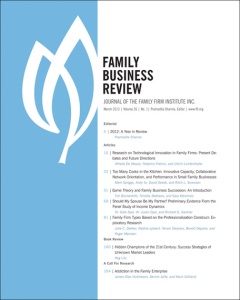Listen to the Latest Podcast from Family Business Review!
 In the latest podcast from Family Business Review, assistant editor Karen Vinton and author Robert Smith discuss his article on the usefulness of the qualitative method of visual ethnography in producing new insights into family business research. The article, entitled “Seeing the Light: Using Visual Ethnography in Family Business Settings,” appeared in the March 2015 issue of Family Business Review.
In the latest podcast from Family Business Review, assistant editor Karen Vinton and author Robert Smith discuss his article on the usefulness of the qualitative method of visual ethnography in producing new insights into family business research. The article, entitled “Seeing the Light: Using Visual Ethnography in Family Business Settings,” appeared in the March 2015 issue of Family Business Review.
You can click here to download the podcast. You can also read the article for free by clicking here.
Want to hear more? Click here to browse more podcasts from Family Business Review and here to subscribe to the SAGE Management and Business podcast channel on iTunes. You can also sign up for e-alerts and get notifications of all the latest research from Family Business Review sent directly to your inbox!
 Robert Smith, MA, PhD, is Professor of Enterprise and Innovation at the University of the West of Scotland. His research interests are eclectic but include family business, entrepreneurship, narrative, aesthetics, and semiotics.
Robert Smith, MA, PhD, is Professor of Enterprise and Innovation at the University of the West of Scotland. His research interests are eclectic but include family business, entrepreneurship, narrative, aesthetics, and semiotics.
 Karen L. Vinton, Ph.D., is assistant editor of FBR and a 1999 Barbara Hollander Award winner and Professor Emeritus of Business at the College of Business at Montana State University, where she founded the University’s Family Business Program. An FFI Fellow, she has served on its Board of Directors and chaired the Body of Knowledge committee.
Karen L. Vinton, Ph.D., is assistant editor of FBR and a 1999 Barbara Hollander Award winner and Professor Emeritus of Business at the College of Business at Montana State University, where she founded the University’s Family Business Program. An FFI Fellow, she has served on its Board of Directors and chaired the Body of Knowledge committee.






























































































